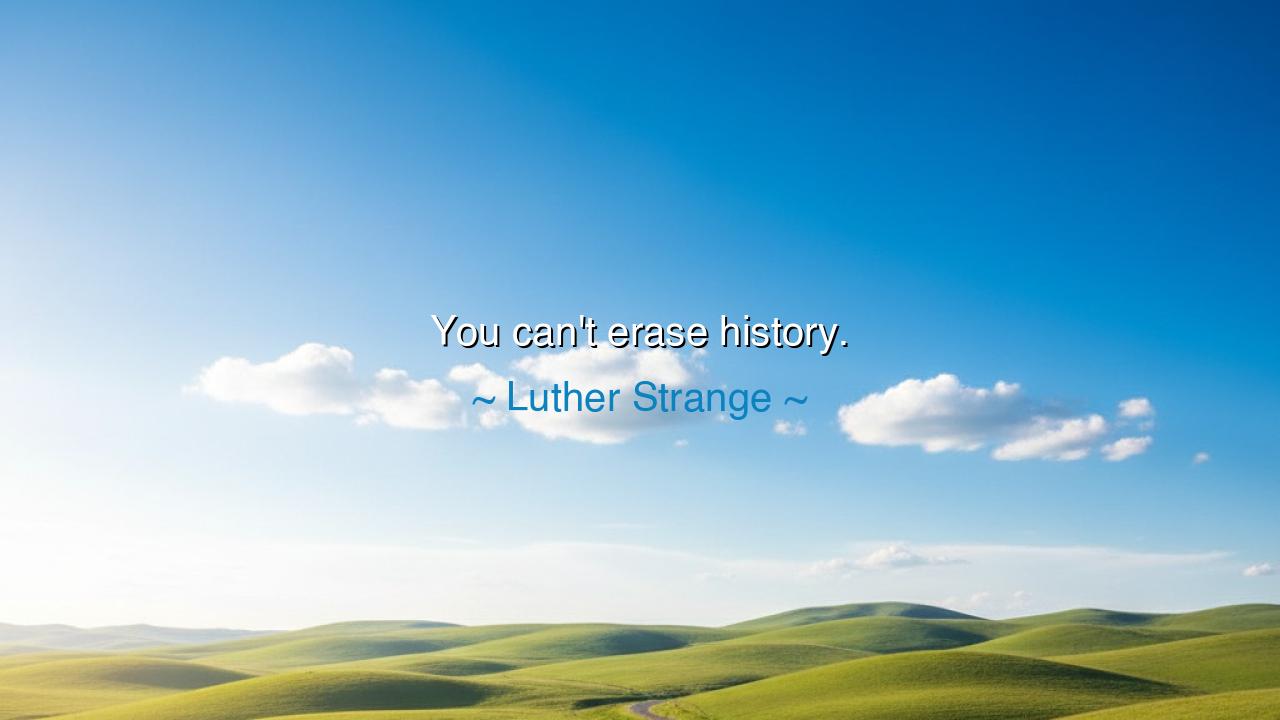
You can't erase history.






The American statesman Luther Strange once declared: “You can’t erase history.” Though simple in form, these words carry the weight of centuries — a reminder that time may move forward, but its shadow follows. Strange spoke these words in a modern age of debate and reckoning, when societies wrestled with their pasts, pulling down statues, rewriting narratives, and seeking justice for old wrongs. Yet beneath the politics lies a timeless truth: the past cannot be undone. It may be rewritten by men, forgotten by generations, or buried beneath monuments, but it lives on — in memory, in consequence, in the unseen shaping of who we are.
To understand the origin of this thought, one must see that it did not arise from arrogance or nostalgia, but from an understanding of time’s permanence. Strange, like many leaders of his age, stood in the midst of a world seeking to cleanse itself of its darker chapters. But what he reminded his listeners is that to erase the past is to erase understanding itself. History, no matter how bitter, is not a wound to be cut away but a teacher whose lessons are carved into the soul of nations. It is not meant to flatter us, but to humble us — for in remembering where we have erred, we guard ourselves from falling again.
From the dawn of civilization, wise men have known that the past is indestructible. The scribes of Egypt carved their stories into stone, so that even when kingdoms fell, the record endured. The Greeks, in their tragedies, taught that those who tried to defy fate only fulfilled it more completely. The past is like the roots of a great tree — unseen, perhaps buried, but nourishing all that grows above it. When a people try to sever those roots, they do not free themselves; they wither. Strange’s words are a warning: that to deny one’s history — to erase it — is to invite the slow death of ignorance.
Consider the story of post-war Germany. After the Second World War, when the world saw the horror of the Holocaust, there were those who might have wished to hide it, to forget it, to move on from shame. But Germany did not erase its history — it confronted it. It preserved the camps as memorials, taught the crimes in its schools, and turned memory into responsibility. In doing so, it transformed guilt into wisdom, and history into a moral compass. This is what Luther Strange’s words call us toward: not denial, but remembrance — not glorifying the past, but learning from it.
In contrast, there are those who have tried to bury their sins. Soviet Russia, for decades, rewrote its own story — erasing the names of the executed, airbrushing out its fallen heroes, silencing the cries of the oppressed. But truth, though buried, cannot die. When the archives were opened, the ghosts returned, and history itself demanded to be seen. The lesson is clear: you cannot erase what has already been lived. To attempt it is to fight against the nature of time, against the very soul of truth.
The words of Strange also carry a deeply personal meaning. For each human being is a living record of their own history — of pain endured, choices made, love given and lost. Many wish to forget their pasts, to erase their mistakes. But the wise know that our scars are our teachers. To erase them would be to erase ourselves. Every sorrow, every triumph, every regret becomes part of the greater story of who we are becoming. As nations carry their histories in monuments and memory, so too must individuals carry theirs in heart and conscience.
Therefore, let the teaching of this quote be heard: do not seek to erase history — seek to understand it. Face it with courage, acknowledge its darkness, and draw from it the light of wisdom. In your life, and in your nation, remember that the past is not an enemy but an inheritance. It is the soil from which your character grows. To deny it is to live in illusion; to accept it is to walk in truth.
So, my friends, remember always that you can’t erase history, but you can redeem it. Let remembrance guide your actions. Let understanding shape your justice. Let humility temper your pride. For history, once lived, cannot be undone — but how we live with it, how we honor it, how we learn from it — that is the story still waiting to be written.






AAdministratorAdministrator
Welcome, honored guests. Please leave a comment, we will respond soon